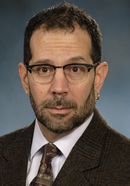MIRECC / CoE
VISN 5 MIRECC Matters Spring 2021 - Director's Corner

VISN 5 MIRECC Director's Corner: Taking Stock and Moving Forward
Richard Goldberg, Ph.D.
Director, VISN 5 MIRECC
Inside the Spring 2021 Issue:
- Director's Corner: Taking Stock and Moving Forward
- Holistic Healing through Horses
- Straight from the Investigator - Increasing Social and Community Engagement in Veterans Living with Schizophrenia: A Treatment Outcome Study
- VA Connection Plans: A Whole Health Intervention to Promote Social Connections for Veterans
- VISN 5 MIRECC Recovery-Oriented Educational Webinars and Seminars

The VISN 5 MIRECC successfully completed its reverse site visit/renewal review in September of 2020 and the review panel recommended full support for the next five years. During the reverse site visit the leadership team of the VISN 5 MIRECC presented a summary of our mission-related accomplishments that support and enhance the recovery and community functioning of Veterans with serious mental illness (SMI). The VISN 5 MIRECC integrated programs of research, education and clinical training and consultation focus on the development, evaluation and implementation of recovery-oriented evidence-based treatments and services for these Veterans. Over the past five years our work has had a national impact on advancing the science and practice of recovery in five key areas: Peer Support, Enhancing Treatment and Community Engagement, Women’s Mental Health, Whole Health and Suicide Prevention. As noted during our presentation, the VISN 5 MIRECC mission-related efforts and outputs are well aligned with a range of VA policies, priorities and directives including the Uniform Mental Health Services in VA Medical Centers and Clinics (UMHSA) last updated in 2015 and the Psychosocial Rehabilitation and Recovery Services Directive issued in 2019.
Specific commendations included praise for our steady influx of external funding and our productive publication record. We were also cited for our impressive array of intervention development efforts across a variety of recovery-oriented domains in SMI. Our MIRECC was also commended for being solidly grounded in its “lane” of recovery and evidencing the ongoing potential to be a national leader and significant asset for supporting both the Whole Health and Mental Health Recovery transformation efforts within the VHA.
The MIRECC was also commended for our expansion and modernization of our educational and dissemination efforts over the past five years, culminating in the hire of a dedicated Communications Specialist. We were also praised for significant enhancements to our post-doctoral training program leading to four former fellows successfully obtaining VA ORD Career Development Awards in the past five years. We also received commendation for our recent success in overseeing the expansion of the VA National Interprofessional Fellowship in Psychosocial Rehabilitation and Recovery from six to nine sites. Our Small Grants Program for Recovery-Fostering Clinical and Educational Innovations was also highlighted as a unique strength. Finally, we were also commended for developing and benefiting from synergy across all of our cores in support of our mission.
In terms of recommendations for moving forward, we were encouraged to consider dedicating increased time and resources to the implementation of the recovery-oriented treatments and services that we developed across our programs of research into clinical practice. Specific suggestions included seeking out training in implementation science, pursuing external funding focused on program implementation, partnering with/seeking consultation from experts across the VHA with expertise in implementation science, and considering replacing recently departed senior staff with investigators with expertise in implementation science. We were also encouraged to expand our exploration of the overlaps between Whole Health and Mental Health Recovery to support more synergistically the wellness and functioning of SMI Veterans. Further, we were also encouraged to expand research on the use of tele-health modalities to deliver recovery oriented mental health care, including group interventions for Veterans with SMI.
I am very excited about the next five years and am confident that we will continue to advance the science and practice of recovery, make meaningful contributions to our operational partners in Central Office and improve the lives of Veterans and their families.



















